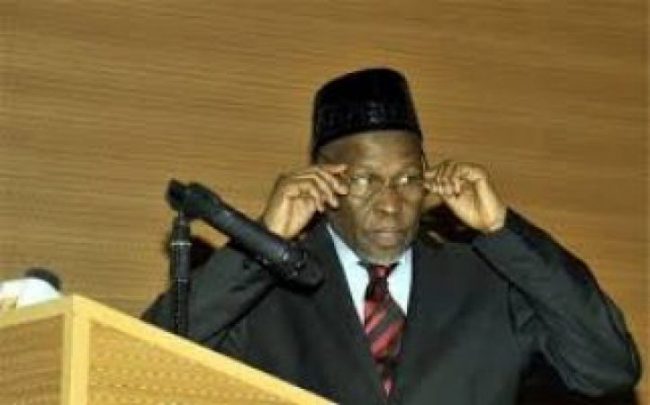
The Chief Justice of Nigeria (CJN) Justice Ibrahim Muhammad, on Monday said that lack financial autonomy is the biggest challenge to judicial independence in Nigeria and until this is tackled the third arm of government can not be truly independent.
Justice Muhammad said, “If you say that I am independent, but in a way, whether I like it or not, I have to go cap in hand asking for funds to run my office, then I have completely lost my independence. It is like saying a cow is free to graze about in the meadow but at the same time, tying it firmly to a tree. Where is the freedom?
The topmost judicial officer in the country, however, warned Governments at various levels to allow the judiciary to enjoy its independence without undue interference, saying “we will never be subservient to anybody, no matter his position in the society”.
He spoke at a special session that was held to mark the commencement of the 2019/2020 legal year of the Supreme Court and swearing-in ceremony of 38 newly conferred Senior Advocates of Nigeria (SAN) held in Abuja.
Justice Muhammad maintained that the judiciary under his watch will uphold the tenets of the constitution as the supreme law of the land.
He however decried that despite the fact that the constitution provided for s separation of powers and independence of the three arms of government, he has continued to go cap in hand to beg for funds to run the judiciary, a situation he said has impacted negatively on the administration of justice in the country.
He said it was time for the judiciary to take its destiny in its hand, insisting that “we need to borrow a leaf from other climes where things are done rightly so that we don’t keep repeating the same mistake and expect to make progress in our administration of justice”. The CJN said: “There have been various debates at different fora as to whether the Nigerian Judiciary is truly independent. In most cases, discussants always assess the situation from varied perspectives; and that largely accounts for the often conflicting answers given.
The Nigerian Judiciary, to a large extent, is independent in conducting its affairs and taking decisions on matters before it without any extraneous influence. At the Supreme Court, like I have always said, we are totally independent in the way we conduct our affairs, especially in our judgments. We don’t pander to anybody’s whims and caprices. If there is any deity to be feared, it is the Almighty God. We will never be subservient to anybody, no matter his position in the society.
“Be that as it may, when we assess the judiciary from the financial perspective, how free can we say we are? The annual budget of the Judiciary is still a far cry from what it ought to be. The figure is either stagnated for a long period or it goes on a Progressive decline.
The only thing I can do at this juncture is to plead with all concerned to let us enjoy our independence holistically.
“If you say that I am independent, but in a way, whether I like it or not, I have to go cap in hand asking for funds to run my office, then I have completely lost my independence. It is like saying a cow is free to graze about in the meadow but at the same time, tying it firmly to a tree. Where is the freedom?
“The issue of the salaries of judicial officers is still occupying the front burner of national discourse. It is one of the many issues yet to be addressed by the government. I make bold to say that the salaries of judicial officers in Nigeria are still very far from an ideal package to take home.
“Effort should be made by the relevant authorities to increase the salary and also work out measures to improve the welfare package of judicial officers, especially after retirement. The comfort of my brother justices in various courts across the country is one of my topmost priorities and I will pursue it with the seriousness it deserves. “Ideally, retired justices should be accorded the benefit of annual medical treatment locally and abroad, if the ‘ need arises to go for foreign Medicare. The subsisting poor medical care has accounted for the increasing deaths of most of our retired justices, as they often retire into penury and even without any befitting accommodation to rest their pale nerves.
“The gross underfunding and neglect of the judiciary over the years have impacted negatively on the infrastructure and personnel within the system. It is to a large extent, affecting productivity, increasing frustration and deflating morale.
“That is certainly not a good omen at this stage of our nationhood. The Constitution provides for separation of powers and independence of the three arms of government. I am using this medium to appeal to governments at all levels to free the judiciary from the financial bondage it has been subjected to over the years.
“Let it not just be said to be independent but should, in words and actions, be seen to be truly independent. There should not be any strings attached. We would not like to negotiate our financial independence under any guise. Even as I speak now, some States Judiciaries are still having issues with their respective governments. A stitch in time will certainly save nine. Let the judiciary take its destiny in its hands”, the CJN stated.
While enjoining the Nigerian Police Force and other security agencies to always conduct proper investigations before charging suspects to court, the CJN, said the apex court had in the last legal year, entertained a total number of 1,874 cases, comprising of motions and appeals.
